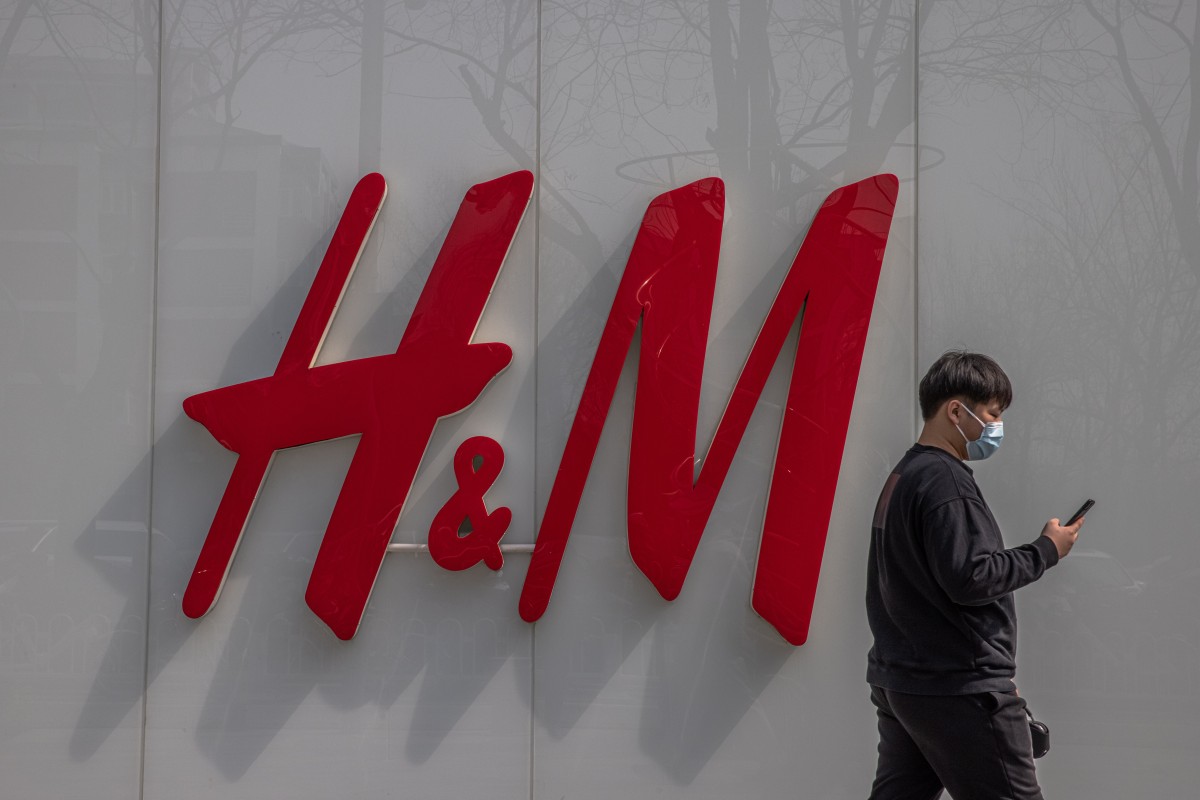
China calls for boycott of H&M, criticises Adidas, Nike and Zara over statements on Xinjiang
- The comments follow a decision from the European Union, US, Britain and Canada to impose sanctions on some officials blamed for abuse in the region
- Chinese stars such as Wang Yibo, Song Qian, Huang Xuan and Tang Songyun announced they would cut endorsement contracts with the brands
 International clothing brands H&M, Nike and Adidas face backlash in China for refusing to buy Xinjiang cotton over claims of forced labour and genocide in the region. Photo: EPA
International clothing brands H&M, Nike and Adidas face backlash in China for refusing to buy Xinjiang cotton over claims of forced labour and genocide in the region. Photo: EPAChinese state TV called for a boycott of H&M as Beijing lashed out at foreign clothing and footwear brands after sanctions were placed on Chinese officials accused of human rights abuses in the Xinjiang region.
The Communist Party criticised H&M for saying in March 2020 that it would stop buying cotton from the northwestern Chinese region. The Swedish retailer joined other brands in expressing concern about reports of forced labour in the area.
Party newspaper Global Times also criticised statements by Burberry, Adidas, Nike, New Balance and Zara about Xinjiang as early as two years ago.
Why Disney’s live-action Mulan became so controversial
“For enterprises that touch the bottom line of our country, the response is very clear: don’t buy!” China Central Television said on its social media account. It said the H and M in the Swedish name stood for Chinese words meaning lie and falsehood.
The attacks follow Monday’s decision by the 27-nation European Union, the United States, Britain and Canada to impose travel and financial sanctions on four Chinese officials blamed for abuses in Xinjiang.
More than 1 million people in Xinjiang, most of them from predominantly Muslim ethnic groups, have been confined to work camps, according to foreign researchers and governments. Beijing denies mistreating them and says it is trying to promote economic development and stamp out radicalism.
Uygur scholars in Xinjiang have been going missing
“The so-called existence of forced labour in the Xinjiang region is totally fictitious,” said a Commerce Ministry spokesman, Gao Feng. He called on foreign companies to “correct wrong practices” but did not say what they were expected to do.
Celebrities including Wang Yibo, a popular singer and actor, announced they were breaking endorsement contracts with H&M and Nike.
H&M products were missing from China’s most popular e-commerce platforms, Alibaba Group’s TMall and JD.com. News reports said they were removed due to public criticism over its Xinjiang statement. The companies didn’t respond to requests for comment.
A woman walks past a store of sporting goods retailer Adidas at a shopping mall in Beijing. Photo: Reuters
The criticism began when the ruling party’s Youth League on Wednesday called attention to last March’s H&M statement on its social media account. It gave no indication why it singled out the company or an explanation for citing a year-old statement.
“Spreading lies to boycott Xinjiang while wanting to make money in China? Wishful thinking,” the Youth League said.
The Global Times said Burberry, Adidas, Nike and New Balance also made “cutting remarks” about Xinjiang cotton. A separate Global Times report cited what it said was a statement by Zara that it had a “zero-tolerance approach towards forced labour.”
Report: China forces birth control on Uygur minorities
H&M’s statement last year cited a decision by the Better Cotton Initiative, an industry group that promotes environmental and labour standards, to stop licensing Xinjiang cotton because it was “increasingly difficult” to trace how it was produced.
In September, H&M announced it would stop working with a Chinese manufacturer that was accused of using forced labour in a unit unrelated to the Swedish brand.
In January, Washington imposed a ban on imports of cotton from Xinjiang, a major supplier to clothing producers for Western markets.
China’s official outrage has focused on Europe, possibly because relations with the EU had been amicable amid tension with Washington over trade disputes and accusations of Chinese spying and technology theft.
TikTok is being used by Uygurs to raise awareness of those detained in camps
Comments on the internet cited Uniqlo and Gap as other possible offenders. It was unclear how many of those accounts were members of the public.
Pop star Wang’s announcement that he was quitting as a Nike “brand ambassador“ didn’t mention Xinjiang. It said he “firmly resists any words and actions that pollute China.”
Others including singer and actress Song Qian, a former member of Korean pop group f(x) who also is known as Victoria Song, and actor Huang Xuan, who announced they would end endorsement contracts with H&M. Actress Tang Songyun said she was breaking ties with Nike.